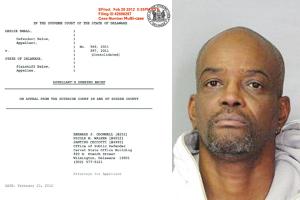State responds to Leslie Small's appeal
Leslie Small sits on death row at James T. Vaughn Correctional Center in Smyrna, found guilty of the brutal murder of June McCarson in November 2009. Small has asked Delaware Supreme Court to reverse the conviction and sentence. But a response from the state argues his conviction should stand and his sentence is proportionate to his crime.
A primary issue in the appeal is whether prosecutors jeopardized the fairness of Small’s penalty hearing by encouraging the jury to dismiss certain mitigating circumstances as excuses.
Small, 54, was found guilty of seven felony charges, including two counts of first-degree murder for stabbing McCarson, 78, with a pair of scissors in her Lewes home. In a recorded police interview shown at trial, Small told investigators he wanted to steal McCarson’s pocketbook and use her money to buy crack cocaine.
The jury found Small guilty at trial and following the penalty phase proceeding, unanimously recommended the death penalty. Sussex County Superior Court Judge Richard Stokes imposed the death sentence July 22.
Appellant attorneys of the Public Defender’s Office Bernard O’Donnell, Nicole Walker and Santino Ceccotti filed a Feb. 20 opening brief, appealing Small’s death sentence. His attorneys said the sentence should be overturned because prosecutors made unfair comments during Small’s penalty hearing.
Deputy Attorney General Abby Adams and Chief of Appeals Paul Wallace, of the Attorney General’s Office, filed a response to Small’s appeal May 14. “Small admits that he raised no objection at the trial to the now complained-of statements and arguments,” the state’s brief said.
The response said during the trial, the state proved all necessary aggravating circumstances to warrant the death penalty. According to the response, aggravators included Small’s history of violence against women and his lack of true remorse for McCarson’s murder.
If mitigating factors outweigh aggravating factors in a capital murder case, a jury would likely recommend a lesser sentence for the defendant.
According to Small’s appeal, prosecutors tried to convince the jury that the mitigating circumstances in Small’s case were just excuses for his actions. Small’s appeal said the jury likely rejected Small’s plea for a life sentence because it mistook mitigators for excuses.
In their response, Adams and Wallace say prosecutors’ comments during the penalty phase were proper. According to the state’s brief, prosecutors can argue certain mitigators should not be given great weight “as long as the prosecutor does not improperly state the law by arguing to the jury that it is prohibited from considering the evidence as mitigating unless it is offered to excuse the defendant’s conduct.”
The state’s brief quotes a 2011 case, Commonwealth vs. Chmiel, to support its argument: “A prosecutor may rebut mitigation evidence in his or her arguments and may urge the jury to view such evidence with disfavor.”
Small’s appeal also said the state’s expert witness, psychiatrist Stephen Mechanick, told the jury Small refused to talk about what happened the day of McCarson’s murder. “This, in turn, allowed the jury to draw a negative inference from Small’s exercise of his right to counsel and right to remain silent,” the appeal said.
Adams and Wallace say the statement was harmless. “The prosecutor did not use the information to argue that Small was uncooperative or to impeach Small,” the brief said. The statement was made so jurors could assess the quality of Mechanick’s opinion, state attorneys wrote.
According to Jason Miller, spokesman for the Attorney General’s Office, Small’s attorneys will submit a reply brief, and oral arguments will take place Wednesday, August 8.






















































